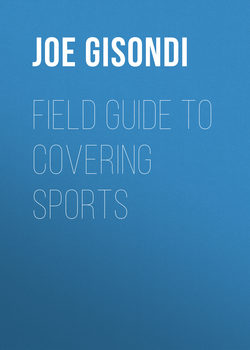Читать книгу Field Guide to Covering Sports - Joe Gisondi - Страница 16
На сайте Литреса книга снята с продажи.
There’s No Cheering in the Press Box
ОглавлениеSo how do fans and sports journalists differ? In more ways than most people realize.
For example, fans can make unsubstantiated comments without consequences, the kind that can be unjustifiably critical of those who coach and play. A sports fan can say the goalie sucks. But a sports reporter needs to be more detailed and more diplomatic. Had a defender moved out of position? Maybe the goalie’s been playing hurt, diving at pucks despite a broken finger or severely sprained ankle. Or maybe the goalie has just had a few bad performances. That happens to all of us—even those who write for a living. Sources won’t trust someone who’s unwilling to verify the facts. And you’ll lose sources rather quickly by making mean, lazy comments.
Fans can openly cheer for their favorite teams and players, high-fiving friends and joyously screaming after a game-winning score. But there’s no cheering in the press box. Or in game stories. Or while interviewing players and coaches after a game. Cheering clouds perspective, preventing a sports reporter from discerning the plays, trends, or strategies that enabled a team to win. In addition, you could lose sources, who might refrain from speaking with someone spinning everything for the home team.
In addition, sports reporters need to abide by professional codes of conduct, such as those outlined by the Society of Professional Journalists and the Associated Press Sports Editors (published later in this book). They can’t accept free tickets or eat the free food that, as fans, they’d happily scarf down.
Fans can steal others’ work, taking credit for a phrase or key argument when talking with friends or while tweeting. Sports journalists, though, must find new information and attribute older information, often offering this other information through embedded links.
Fans can skip a game for inclement weather, if the team is hopeless or when they have something else to do. Beat reporters faithfully cover games at night, on weekends, during holidays, and even when the job means missing important family events.
Fans can complain that nothing interesting happened in a midseason baseball or basketball game. Sports writers need to find something unique about a minor league baseball game in late July, an NBA game in mid-February, or a minor league hockey game in April, by taking detailed notes, asking precise questions, and keeping score. They must know the game well enough to find these new angles and write a comprehensive account of the game.
Fans prepare for games by listening to talk radio, watching pregame shows, and reading preview stories for their information. Sports journalists supply this information through exhaustive research and reporting.
Before behaving like a professional, you’ll need to look like one, by dressing properly—wearing slacks and collared shirts instead of T-shirts and jeans. For outdoor summer events, you can wear a nice pair of shorts or a skirt instead. Obviously, don’t wear any clothing that represents a school or team, something that destroys credibility.
Being a fan doesn’t qualify someone to be a sports journalist any more than enjoying Judge Judy qualifies someone to be a lawyer. Dress and act professionally and learn your trade, if you expect sports information directors, coaches and players to take you seriously.
Sports Insider: On Getting Hooked
I actually wrote my first sports story when I was in high school for the Daily Transcript in Dedham, Mass. I went to Westwood High School, and our girls’ teams were exceptional, but the local paper seemed to only cover the boys’ games. I was very frustrated by this and complained about it often. My dad, Fred MacMullan, finally said to me, “Stop complaining and do something about it. Call the sports editor.’’ He stood over me until I did. The sports editor was Frank Wall, and he very nicely explained he’d love to cover the girls, but he didn’t have enough manpower and would I like to write for him? So, I started covering high school sports, often games that I was actually playing in myself. It was an amazing thrill to see my byline for the first time. I was only 16 years old, and it was every bit as exciting as I imagined it would be. I was hooked from then on.
Jackie MacMullan, ESPN Basketball Analyst
